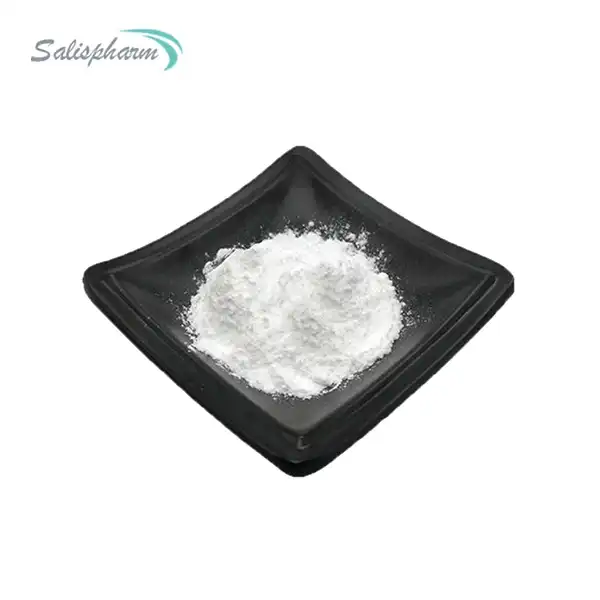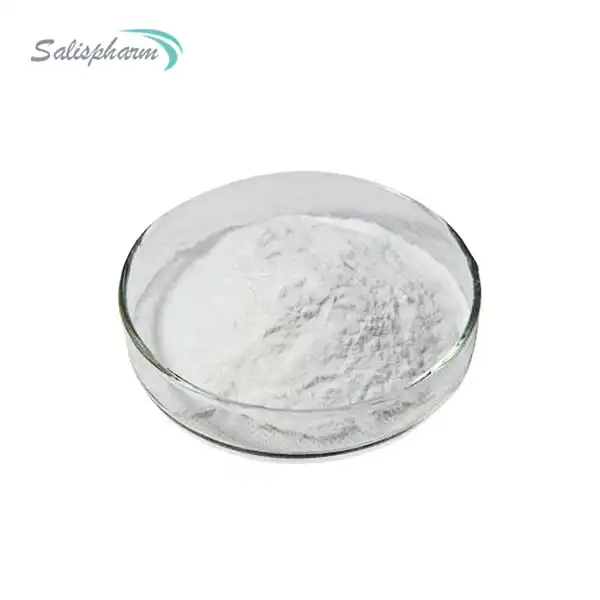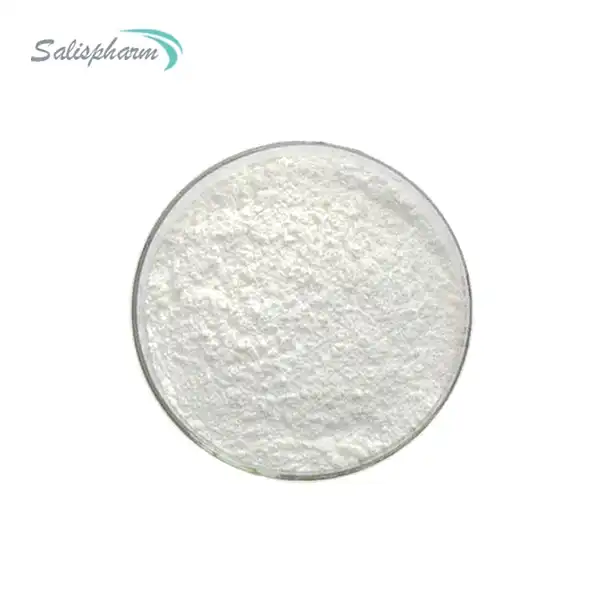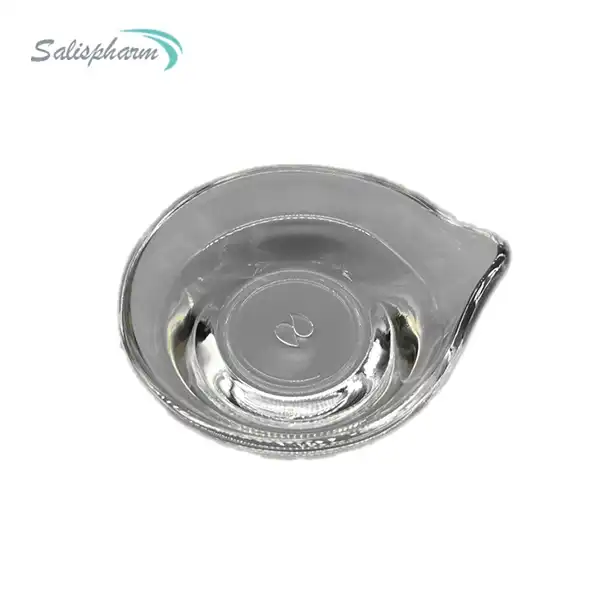Dicyclomine, also known by its brand name Bentyl, is a medication primarily used to treat symptoms of irritable bowel syndrome (IBS) and other gastrointestinal disorders. While it is not classified as a traditional painkiller, dicyclomine can help alleviate abdominal pain associated with IBS by relaxing the smooth muscles in the digestive tract. This antispasmodic action helps reduce cramping and discomfort, which may lead some people to wonder if it can be considered a painkiller in certain contexts.
What are the side effects of dicyclomine powder?
Dicyclomine, like many medications, can cause various side effects that patients and healthcare providers should be aware of. While not everyone experiences side effects, it's important to understand the potential risks associated with this medication.
Common side effects of dicyclomine powder include:
1. Dry mouth: This is one of the most frequently reported side effects. The anticholinergic properties of dicyclomine can reduce saliva production, leading to a feeling of dryness in the mouth.
2. Blurred vision: Some users may experience temporary changes in vision, particularly difficulty focusing on nearby objects.
3. Constipation: Ironically, while dicyclomine is used to treat gastrointestinal issues, it can sometimes cause constipation due to its effects on smooth muscle activity in the digestive tract.
4. Urinary retention: In some cases, dicyclomine may make it difficult to urinate or completely empty the bladder.
5. Dizziness or lightheadedness: These symptoms may occur, especially when standing up quickly from a sitting or lying position.
6. Drowsiness: Some patients report feeling sleepy or less alert after taking dicyclomine.
7. Nausea: Although less common, some individuals may experience nausea as a side effect.
8. Headache: Mild headaches have been reported by some users.
9. Weakness: A general feeling of weakness or fatigue may occur in some patients.
10. Nervousness or agitation: In rare cases, dicyclomine may cause feelings of restlessness or anxiety.
It's important to note that these side effects are generally mild and often diminish as the body adjusts to the medication. However, if any of these side effects persist or worsen, it's crucial to consult a healthcare provider.
In rare cases, more serious side effects may occur, such as:
1. Severe allergic reactions: Signs may include rash, itching, swelling, severe dizziness, or difficulty breathing.
2. Irregular heartbeat: This can manifest as a racing or pounding heartbeat.
3. Confusion or hallucinations: Particularly in elderly patients or those with pre-existing conditions.
4. Heat stroke: Dicyclomine powder can reduce sweating, which may increase the risk of heat-related illnesses in hot environments.
5. Glaucoma: In individuals with narrow-angle glaucoma, dicyclomine may worsen the condition.
Healthcare providers carefully consider the potential benefits and risks when prescribing dicyclomine. They may adjust the dosage or recommend alternative treatments if side effects become problematic. Patients should always inform their doctor about any pre-existing conditions, allergies, or other medications they are taking to minimize the risk of adverse effects.
How long does dicyclomine powder stay in your system?
Understanding how long dicyclomine remains in the body is important for both patients and healthcare providers. The duration of dicyclomine's presence in the system can affect its efficacy, potential for side effects, and interactions with other medications.
Dicyclomine's half-life, which is the time it takes for half of the drug to be eliminated from the body, is approximately 1.8 hours. However, this doesn't mean that the drug is completely out of your system after 3.6 hours. It typically takes about 5 half-lives for a drug to be considered fully eliminated from the body.
For dicyclomine, this means it could take approximately 9 to 10 hours for the majority of the drug to be cleared from your system. However, several factors can influence how long dicyclomine stays in your body:
1. Age: Older adults may metabolize and eliminate the drug more slowly due to decreased liver and kidney function.
2. Liver function: The liver plays a crucial role in metabolizing dicyclomine. Individuals with liver disease may process the drug more slowly.
3. Kidney function: While dicyclomine powder is primarily metabolized by the liver, kidney function can also affect how quickly the drug is eliminated from the body.
4. Dosage: Higher doses of dicyclomine may take longer to be fully eliminated from the system.
5. Frequency of use: Regular, long-term use of dicyclomine may lead to some accumulation in the body, potentially extending its presence in the system.
6. Individual metabolism: Each person's body processes medications differently, which can affect how long dicyclomine remains active.
7. Other medications: Certain drugs may interact with dicyclomine, potentially altering its metabolism and elimination rate.
It's important to note that while the drug may be mostly eliminated from the bloodstream within a day, its effects on the body can last longer. The antispasmodic action of dicyclomine on smooth muscles in the digestive tract may continue for some time after the drug is no longer detectable in the blood.
For patients taking dicyclomine, this information is relevant in several ways:
1. Dosing schedule: Understanding how long the drug stays in your system can help you and your healthcare provider determine the most effective dosing schedule.
2. Managing side effects: If you experience side effects, knowing the drug's duration in your system can help predict when these effects might subside.
3. Drug interactions: If you need to start a new medication, your doctor may advise you on how long to wait after your last dose of dicyclomine to avoid potential interactions.
4. Discontinuation: If you need to stop taking dicyclomine for any reason, your healthcare provider can guide you on when the drug will be fully out of your system.
5. Medical procedures: For certain medical tests or procedures, you may need to temporarily stop taking dicyclomine. Knowing its elimination time helps in planning these events.
Always consult with your healthcare provider before making any changes to your medication regimen. They can provide personalized advice based on your specific health situation and needs.
Can dicyclomine powder be used for stomach pain?
Dicyclomine powder is indeed commonly prescribed for certain types of stomach pain, particularly those associated with irritable bowel syndrome (IBS) and other functional gastrointestinal disorders. However, it's important to understand the specific conditions under which dicyclomine is effective and when it might not be the appropriate choice for stomach pain relief.
Dicyclomine's primary mechanism of action is as an antispasmodic agent. It works by relaxing the smooth muscles in the walls of the intestines and other organs in the digestive system. This action helps to reduce painful spasms and cramps that are often associated with IBS and similar conditions. Here's a more detailed look at how dicyclomine can be used for stomach pain:
1. Irritable Bowel Syndrome (IBS):
Dicyclomine is particularly effective for the pain and discomfort associated with IBS, especially for those who experience IBS with diarrhea (IBS-D) or mixed IBS (IBS-M). The drug helps to alleviate abdominal cramping, bloating, and diarrhea that are hallmarks of this condition.
2. Functional Dyspepsia:
Some patients with functional dyspepsia, a condition characterized by recurrent pain or discomfort in the upper abdomen, may find relief with dicyclomine. The drug can help reduce the sensation of fullness and bloating that often accompanies this condition.
3. Menstrual Cramps:
While not its primary indication, some healthcare providers may prescribe dicyclomine off-label for menstrual cramps. The drug's antispasmodic properties can help relieve the uterine contractions that cause menstrual pain.
4. Diverticulitis:
In some cases, dicyclomine may be used as part of the treatment for diverticulitis, a condition where small pouches in the colon become inflamed or infected. The drug can help manage associated abdominal pain and cramping.
5. Biliary Colic:
Dicyclomine may sometimes be prescribed to help manage the pain associated with biliary colic, which is caused by gallstones.
It's crucial to note that while dicyclomine can be effective for these types of stomach pain, it is not appropriate for all forms of abdominal discomfort. For example:
1. Acute Infections: Dicyclomine is not effective against stomach pain caused by acute infections such as gastroenteritis or food poisoning.
2. Inflammatory Bowel Diseases: Conditions like Crohn's disease or ulcerative colitis are not typically treated with dicyclomine.
3. Appendicitis: Dicyclomine should not be used if appendicitis is suspected, as it may mask symptoms and delay necessary treatment.
4. Mechanical Obstructions: Pain due to physical blockages in the digestive tract requires different interventions.
5. Peptic Ulcers: Dicyclomine is not the primary treatment for ulcer-related pain.
When considering dicyclomine for stomach pain, it's important to:
1. Obtain a proper diagnosis: Before using dicyclomine, it's crucial to have a healthcare provider determine the underlying cause of the stomach pain.
2. Follow prescribed dosages: Dicyclomine should be taken exactly as prescribed by a healthcare professional.
3. Be aware of potential side effects: As discussed earlier, dicyclomine can cause various side effects that should be monitored.
4. Consider alternative treatments: For some patients, dietary changes, stress management techniques, or other medications may be more appropriate for managing stomach pain.
5. Monitor effectiveness: If dicyclomine doesn't provide relief or if symptoms worsen, it's important to follow up with a healthcare provider.
6. Be cautious with long-term use: Prolonged use of dicyclomine should be monitored by a healthcare professional to assess ongoing benefits and potential risks.
In conclusion, while dicyclomine powder can be an effective treatment for certain types of stomach pain, particularly those related to IBS and other functional gastrointestinal disorders, it's not a universal solution for all abdominal discomfort. Proper diagnosis and guidance from a healthcare provider are essential to ensure that dicyclomine is used appropriately and effectively for managing stomach pain.
If you are also interested in this product and want to know more product details, or want to know about other related products, please feel free to contact iceyqiang@aliyun.com.
References:
1. National Library of Medicine. (2022). Dicyclomine. MedlinePlus.
2. American Gastroenterological Association. (2021). Irritable Bowel Syndrome (IBS).
3. Ford, A. C., et al. (2014). Effect of antidepressants and psychological therapies, including hypnotherapy, in irritable bowel syndrome: systematic review and meta-analysis. American Journal of Gastroenterology, 109(9), 1350-1365.
4. Ruepert, L., et al. (2011). Bulking agents, antispasmodics and antidepressants for the treatment of irritable bowel syndrome. Cochrane Database of Systematic Reviews, (8), CD003460.
5. Trinkley, K. E., & Nahata, M. C. (2011). Treatment of irritable bowel syndrome. Journal of Clinical Pharmacy and Therapeutics, 36(3), 275-282.
6. Lacy, B. E., et al. (2016). Bowel Disorders. Gastroenterology, 150(6), 1393-1407.
7. Camilleri, M. (2021). Diagnosis and treatment of irritable bowel syndrome: A review. JAMA, 325(9), 865-877.
8. Chey, W. D., et al. (2015). ROME IV diagnostic criteria for functional gastrointestinal disorders. Gastroenterology, 150(6), 1393-1407.
9. Wilkins, T., et al. (2012). Diagnosis and management of IBS in adults. American Family Physician, 86(5), 419-426.
10. National Institute for Health and Care Excellence. (2017). Irritable bowel syndrome in adults: diagnosis and management. NICE guideline [CG61].









